
This page provides a basic overview of checks and balances and what each branch can do to check the other.
- Subject:
- Social Science
- Material Type:
- Reading
- Provider:
- Ben's Guide to the U.S. Government
- Date Added:
- 03/22/2024

This page provides a basic overview of checks and balances and what each branch can do to check the other.

The principle of checks and balances prevents one branch of government from becoming too powerful. Examples of checks and balances include vetoing of bill, ratifying treating, judicial review and others. This lesson provides video clips with examples and explanations of checks and balances.

In this lesson students will examine the concept of "citizen" from a definitional perspective of what a citizen is and from the perspective of how citizenship is conferred in the United States. Students will discuss the rights and responsibilities of citizens and non-citizens and review the changing history of citizenship from colonial times to the present.

The purpose of this lesson is to engage students in a discussion of the Constitutional Convention.Students will explore the key disputes that arose during the convention, including most prominently how power would be divided between the federal and state governments and the various branches of government. Furthermore, students with understand the importance of compromise during the Constitutional Convention. They will then apply these observations to other historical examples of debate and compromise to understand the nature of decision-making and civic discourse--discussion rooted in mutual respect for differences and desires for understanding--in the United States.

The United States Founders believed that certain civic virtues were required of citizens in order for the Constitution to work. Numerous primary sources—notably the Federalist Papers and the Autobiography of Ben Franklin—point us to the "Foundersâ" Virtues." Before exploring the Documents of Freedom, it is important to understand civic virtue as an essential element of self-government.

Engaging, teacher-created lesson plans on the Constitutional Convention, Freedom of Speech, 4th Amendment, Electoral College, Federalist and Federalism, more.
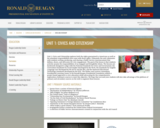
Explores the rights guaranteed to Americans as well as the attendant responsibilities that come with those rights...The Walter and Leonore Annenberg Presidential Learning Center at the Ronald Reagan Presidential Foundation utilizes a project based approach to civic education while advocating for the comprehensive exploration of primary sources to meet this objective.

This resource from the National Constitution Center includes an introduction, big questions, recorded class sessions, briefing documents, slide decks, and worksheets to help teach students the importance of civil dialog related to the United States Constitution.
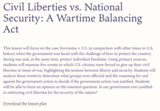
This lesson will focus on the case Korematsu v. U.S. in comparison with other times in U.S. history when the government was faced with the challenge of how to protect the country during war and, at the same time, protect individual freedoms. Using primary sources, students will examine five events in which U.S. citizens were forced to give up their civil liberties in times of war, highlighting the tension between liberty and security. Students will analyze these events to determine what groups were affected and the reasoning for and against the government action to decide if the government action was justified. Students will be able to form an opinion on the essential question: Is our government ever justified in restricting civil liberties for the security of the nation?

In this lesson, developed by and included with the permission the LBJ Presidential Library, students will use primary source documents to investigate the disappearance of three civil rights workers during the Freedom Summer of 1964.

The purpose of this lesson to assist student understanding of why the American Constitution places ultimate authority of the military in the hands of civilians rather than military leaders. Students should appreciate the historical uniqueness of the American military as an extension of constitutional principles in which the people always have the last word.
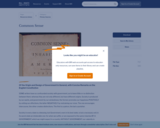
Thomas Paine published Common Sense in January 1776 support of the Patriot cause. Using clear, plain language, Paine rallied the colonists to support the break from Britain. He explained, "I am not induced by motives of pride, party, or resentment to espouse the doctrine of separation and independence; I am clearly, positively, and conscientiously persuaded that it is the true interest of this continent to be so."

In small groups, students analyze the Emancipation Proclamation, the 13th amendment, and General Order #3 in terms of tone, audience, and message, focusing on similarities and differences.
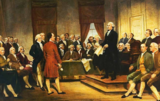
This activity is designed to help students understand the debates at the Constitutional Convention in 1787 that shaped America’s legislative branch of government. The primary goal of this activity is for students to discover how a compromise balanced the needs of large states and small states and how this led to the creation of the current House of Representatives and Senate.
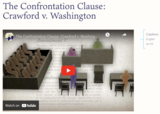
The Sixth Amendment's confrontation clause gives the accused the right âto be confronted with the witnesses against himâ at a criminal trial. This film uses the U.S. Supreme Court case Crawford v. Washington to help explain the history and importance of the confrontation clause and why the framers knew it would be crucial to an effective system of justice.â

In this activity (which is appropriate for introducing the Constitution) students match primary source documents to clauses from Article 1 of the Constitution. Students find six pairs, which reveal the powers of Congress. Online resource.

Congressional oversight is the power of the legislative branch to review, monitor and supervise the actions of the federal bureaucracy. This lesson provides an overview of this congressional power and how it is used to as a check on the executive branch. Students will apply their knowledge of congressional oversight to examples of congressional hearings.

In the Constitution, the Congress is given the sole power of impeachment and removing the President and all civil officers from office. This power of Legislative Branch provides a significant check over the Executive and Judicial Branches. This lesson provides explanations of the Constitutional basis of the power, the process for removing officials and the history of impeachments and removing these officials from office. It also provides discussions on the standards of impeachments and how those are interpreted by Congress.
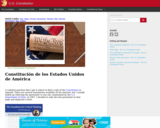
The text of the United States Constitution translated into Spanish. The page does have advertisements as well, so it is best used as a teacher resource.
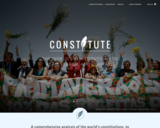
The world's constitutions to read, search, and compare